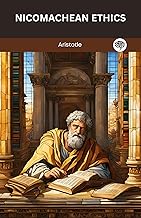
How to Read Aristotle's Books on Ethics
How to Read Aristotle's Books on Ethics
Estimated Reading Time: 10-12 minutes
Introduction
Aristotle, one of the most influential philosophers in Western thought, was born in 384 BCE in Stagira, Greece. A student of Plato and a tutor to Alexander the Great, Aristotle’s contributions spanned various fields, including metaphysics, politics, and ethics. His work, particularly in ethics, has shaped moral philosophy for centuries, providing a framework that remains relevant today.
Aristotle’s ethical philosophy, encapsulated in the "Nicomachean Ethics," offers a unique perspective that emphasizes virtue, character, and the pursuit of happiness (eudaimonia) as the ultimate goal of human life. Unlike his contemporaries who focused on abstract principles or divine command, Aristotle grounded ethics in human experience and the practical realities of life, making his insights invaluable for anyone seeking to understand morality and virtuous living.
Set against the backdrop of ancient Greece, a society grappling with questions of virtue and the good life, Aristotle’s work reflects the cultural and philosophical currents of his time. His approach to ethics not only addresses the individual’s moral development but also considers the role of community and relationships in achieving a fulfilling life.
Why Aristotle's Perspective Matters
Aristotle’s ethical framework is distinctive for several reasons. First, he introduces the concept of virtue ethics, which focuses on the character of the moral agent rather than solely on the consequences of actions or adherence to rules. This approach encourages individuals to cultivate virtues—traits like courage, temperance, and wisdom—as a means of achieving moral excellence.
Additionally, Aristotle’s emphasis on practical wisdom (phronesis) sets him apart from other ethical theorists. He argues that ethical understanding is not merely theoretical but requires the ability to navigate complex situations and make sound judgments based on experience. This practical orientation makes his philosophy accessible and applicable to everyday life.
The impact of Aristotle’s ideas is profound and enduring. His work laid the groundwork for later ethical theories and continues to influence contemporary discussions on morality, character education, and the importance of community in ethical decision-making.
Overview of Recommended Books
Nicomachean Ethics
The "Nicomachean Ethics" is Aristotle’s seminal work on ethics, composed in the form of a series of lectures. The book is divided into ten sections, each addressing different aspects of ethical theory and practice.
Main Themes and Arguments:
- Eudaimonia as the Highest Good: Aristotle posits that the ultimate aim of human life is eudaimonia, often translated as "happiness" or "flourishing." This state is achieved through the cultivation of virtues and living a life of reason.
- Virtue and Character: Aristotle distinguishes between moral virtues (habits) and intellectual virtues (skills), emphasizing that virtues are developed through practice and habituation.
- The Doctrine of the Mean: A central concept in Aristotle's ethics, this doctrine asserts that virtue lies in finding the balance between excess and deficiency. For example, courage is the mean between recklessness and cowardice.
Historical Context and Significance: Written in the 4th century BCE, during a time of political upheaval and philosophical exploration, the "Nicomachean Ethics" reflects Aristotle’s response to the ethical dilemmas of his day. His ideas on virtue and the good life continue to resonate in modern ethical discussions, offering a counterpoint to utilitarianism and deontological ethics.
Key Insights and Takeaways:
- Cultivation of Virtue: The importance of developing good character traits through practice and reflection.
- Practical Wisdom: The necessity of applying ethical principles in real-life situations, emphasizing the role of experience in ethical decision-making.
- Community and Relationships: The understanding that ethical living is not an isolated endeavor but is deeply embedded in social contexts and relationships.
Why Read This Book: The "Nicomachean Ethics" is essential reading for anyone interested in ethics, philosophy, or personal development. Its unique contribution lies in its practical approach to morality, making it relevant for contemporary readers seeking to cultivate a virtuous life. Students, educators, and professionals alike can benefit from Aristotle’s insights into character and ethical reasoning.
Key Themes and Sections
The "Nicomachean Ethics" is rich with themes that build upon one another, creating a comprehensive understanding of ethics. Key themes include:
- The Nature of the Good Life: Aristotle begins by exploring what constitutes the good life and how it can be achieved through virtue.
- The Role of Reason: He emphasizes that rationality is central to ethical behavior and that humans are unique in their capacity for reason.
- Friendship: A significant portion of the text is devoted to the nature of friendship, which Aristotle considers essential for a fulfilling life. He categorizes friendships into three types: those based on utility, pleasure, and virtue, with virtuous friendships being the highest form.
As readers progress through the book, they will notice how Aristotle’s ideas are interconnected, each section reinforcing the others to provide a holistic view of ethics.
Who Would Benefit from Reading These Books
The "Nicomachean Ethics" is suitable for a diverse audience:
- Students and Academics: Those studying philosophy, ethics, or social sciences will find Aristotle’s insights foundational and thought-provoking.
- General Readers Interested in Ethics: Anyone curious about moral philosophy or seeking guidance on ethical living will benefit from Aristotle’s practical approach.
- Professionals Seeking Practical Wisdom: Individuals in leadership or community roles can apply Aristotle’s ideas to foster ethical decision-making and character development.
- Anyone Looking for Personal Growth and Self-Improvement: Readers interested in self-reflection and personal development will find valuable lessons in cultivating virtue and living a fulfilling life.
Recommended Reading Order
To maximize understanding of the "Nicomachean Ethics," consider the following reading strategy:
- Begin with the Introduction (Book I): Start with Aristotle’s definition of the good life and the concept of eudaimonia, as this sets the foundation for the entire work.
- Focus on the Virtues (Books II-V): Delve into the nature of moral and intellectual virtues, exploring how they are cultivated and their importance in ethical living.
- Advanced Study (Books VI-X): Engage with the concepts of practical wisdom, friendship, and the role of community in ethics, which will deepen your understanding of Aristotle’s comprehensive ethical framework.
As you read, take notes on key concepts and reflect on how they apply to your own life. Engaging with Aristotle’s ideas through discussion or writing can also enhance comprehension and retention.
Conclusion
Aristotle’s contributions to ethics through the "Nicomachean Ethics" offer timeless insights into the nature of virtue, character, and the pursuit of a good life. His emphasis on practical wisdom and the cultivation of virtues remains relevant in today’s complex moral landscape. By exploring these works, readers can gain a deeper understanding of themselves and their ethical responsibilities within their communities.
I encourage you to dive into Aristotle’s philosophy, reflect on his teachings, and consider how they can inform your own ethical journey. The wisdom found in the "Nicomachean Ethics" not only enriches our understanding of ethics but also inspires us to strive for a life of virtue and fulfillment.
Featured Books

Nicomachean Ethics
by Aristotle
Published: 350 BC
Along with Plato and Socrates, Aristotle (384-322 B.C.) is one of the triumvirate of philosophers responsible for the establishment of Western philosophy as it exists today. Socrates, Plato and Aristotle were among the first to refine philosophical thought, and Socrates is credited with devising the Socratic Method as a way to argue and debate points rationally. The Ancient Greek philosophers further stressed the importance of virtue and stoicism, advocating the improvement of one’s self through constant learning and knowledge. These teachings and practices formed the foundation for philosophy and psychology as fields of study.Still, Aristotle was very much his own philosopher. Though he studied at Plato’s famous academy, he was not hesitant to counter or criticize Plato’s philosophical stances on certain issues. Aristotle was the most renowned Ancient Greek philosopher for nearly 2,000 years.Aristotle's book on ethics is perhaps the most important work on the subject as it further explores the Socratic question on how men should best live.